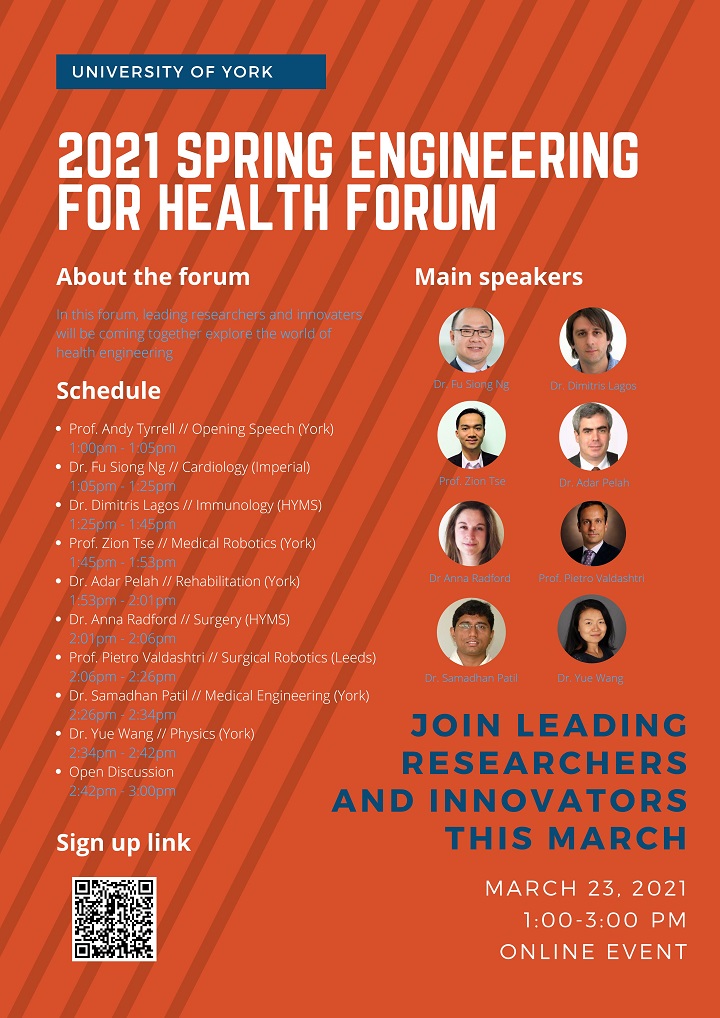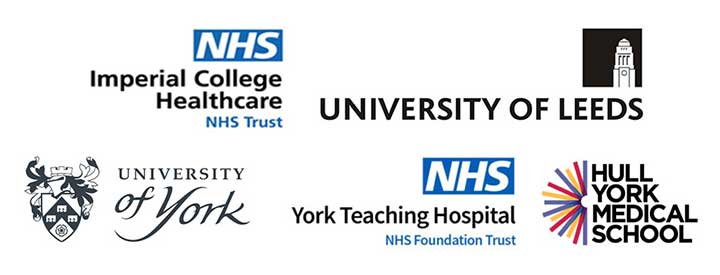2021 Spring Engineering for Health Forum
Join leading researchers and innovators this March for the 2021 Spring Engineering for Health Forum, sponsored by the Engineering for Health group.
Tuesday, 23 March 2021, 1pm - 3pm. This is an online event.

Keynote speeches
- Challenges in the diagnosis and treatment of atrial fibrillation - Fu Siong Ng, Cardiology, Imperial College NHS Trust
- Diagnosis with robotic endoscopy - Pietro Valdashtri, Surgical Robotics, University of Leeds
- Research landscape in Hull-York Medical School - Dimitris Lagos, Immunology, Hull-York Medical School
Invited talks
- Seismocardiology for noncontact vital signs monitoring - Zion Tse, Medical Robotics, University of York
- AI and VR for clinical applications in gait and balance - Adar Pelah, Rehabilitation, University of York
- Biosensors for the point of care diagnostics, drug resistance monitoring and magnetic imaging - Samadhan Patil, Medical Engineering, University of York
- Peeping at the bottom of biofilms - Yue Wang, Physics, University of York
Speakers
Dr Fu Siong Ng, Clinical Senior Lecturer in Cardiac Electrophysiology, Faculty of Medicine, National Heart and Lung Institute
"Challenges in the diagnosis and treatment of atrial fibrillation"
Dr Fu Siong Ng is a Clinical Senior Lecturer in Cardiac Electrophysiology at Imperial College London, and a Consultant Cardiologist at Imperial College Healthcare NHS Trust and Chelsea and Westminster Hospital NHS Foundation Trust. He is a Clinician Scientist and currently leads a programme of research into arrhythmogenic mechanisms alongside performing invasive ablation procedures and implanting pacemakers and defibrillators in patients with heart rhythm disorders. Dr Ng is also the Programme Director for the intercalated BSc in Cardiovascular Sciences at Imperial College London.
Professor Pietro Valdastri, Director of the Institute of Robotics, Autonomous Systems and Sensing, University of Leeds
"Diagnosis with robotic endoscopy"
Professor Valdastri's research is centered around “Medical Capsule Robots”. Capsule robots are meso-scale devices that leverage extreme miniaturization to access and operate in environments that are out of reach for larger robots. In medicine, capsule robots can be designed to enter the human body through natural orifices or small incisions, and to perform endoscopy and surgery while minimizing the invasiveness of the procedure. STORM Lab is currently working on enabling technologies that have the potential to transform endoscopy and surgery. These technologies include magnetic manipulation of capsule robots, water jet propulsion, real-time pose tracking, intermagnetic force measurement, miniature mechatronic design, small-scale electronic circuits and open source design environments. To date, STORM Lab’s research has been featured by several tech magazines, including the BBC, The Financial Times, The Spectator, WIRED, IEEE Spectrum, Medgadget, Medical Design Technology Magazine, Medical Xpress, Newswise, NSF Science Now.
Dr. Dimitris Lagos, Deputy Chair of Departmental Research Committee, Hull York Medical School
"Research landscape in Hull-York Medical School"
Dr Lagos's work is built around the central proposition that studying the function of non-coding RNAs (ncRNA) in the immune system can provide critical insight into both immunity and ncRNA biology. ncRNA transcripts are remarkably more prevalent in mammalian genomes when compared to other species. It has been proposed that this is functionally linked to the increased complexity of mammals. This increased complexity is undoubtedly also reflected in the mammalian immune system. The overarching working hypothesis of his work is that modulation of immune responses is a key function of non-coding RNAs in mammals and that coordination of the machineries that control non-coding and coding RNA metabolism is required for optimal mammalian immunity.
Professor Zion Tse, Chair in Medical Robotics, Department of Electronic Engineering, University of York
"Smart devices for surgery and diagnosis"
Professor Zion Tse is the Chair in Medical Robotics in the Department of Electronic Engineering at York. Prior to his current appointment, he was an Associate Professor in the School of Electrical and Computer Engineering and an Associate Director for the Center for Cyber-Physical Systems at the University of Georgia in the USA. Before that, he was a research fellow at Harvard University, Boston, Massachusetts. His PhD degree in Mechatronics in Medicine was received from Imperial College London in the UK. Most of his academic and professional experience has been in Medical Mechatronics, Surgical Robotics, and Medical Imaging. He has been developing and testing a broad range of medical robots and clinical devices in his career, most of which have been applied in clinical patient trials. His research bridges Engineering and Medicine, connecting multidisciplinary teams of medical doctors, robotics researchers and electronics engineers.
- Professor Zion Tse
Dr Adar Pelah, Reader in Rehabilitation, Department of Electronic Engineering, University of York
"AI and VR for clinical applications in gait and balance"
Dr Adar Pelar's research area includes: virtual and augmented environments, 3D display methods, stroke, low vision and gait rehabilitation technology, locomotion simulators, human visuomotor interactions in locomotion, visual neurphysiology and perception.
Dr Anna Radford, Consultant in Paediatric Surgery, Hull University NHS Trust and Leeds Children’s Hospital. Senior Clinical Lecturer at Hull York Medical School.
Anna Radford is a Consultant in Paediatric Surgery with a specialist interest in Paediatric Urology, working both at Hull University NHS Trust and Leeds Children’s Hospital. She is a Senior Clinical Lecturer at Hull York Medical School. Anna obtained a PhD in 2015 for her thesis entitled “Regenerative Medicine Applications in Paediatric Urology: Barriers and Solutions”. Her ongoing research activities continue in the areas of: tissue engineering in the urinary tract, recurrent urinary tract infections in children, medical innovation in paediatrics and the neuropathic bladder. She sits on the “Young” Academic Working Group in Paediatric Urology in the European Association of Urology and reviews for several journals in the field of paediatric urology. Anna mentors young people from disadvantaged backgrounds who aspire to a career in medicine, as she was once in their shoes. She lives with Andy her long suffering partner of 14 years and her 11 year old sprocker Olly – who keeps her “sane-ish”.
Dr Samadhan Patil, Lecturer in Medical Engineering, Department of Electronic Engineering, University of York
"Biosensors for the point of care diagnostics, drug resistance monitoring and magnetic imaging"
Dr Patil worked for the development of the large area electronic devices and materials during his PhD from the Indian Institute of Technology, Bombay. As a research fellow at the Institute of Microsystems and Nanotechnologies (INESC -MN), Lisbon; he developed the processes for the CMOS compatible MEMS and successfully lead the efforts in developing first hybrid device integrating MEMS with the spin valve and tunnel junction.
Later, he worked at the London Centre for Nanotechnology, University College London and Imperial College to develop a smart chip for the diagnosis of infectious and non-infectious diseases. Before moving to the University of York as a lecturer in medical engineering, he co-developed a personal metabolome device on-a chip at the School of Engineering, University of Glasgow. He is also a co-founder of two start-up companies Multicorder DX and 3P-Sense.
Dr Yue Wang, RAEng Research Fellow, Department of Physics, University of York
"Peeping at the bottom of biofilms"
Dr Yue (Christina) Wang is a RAEng Research Fellow in the Department of Physics at the University of York. She graduated with a MSc degree from the University of St Andrews and Heriot-Watt University in 2008, and a PhD in 2012 from the University of St Andrews. After working on multifunctional organic lasers for on-chip chemosensing with her EPSRC doctoral prize, she moved to York starting her research on nanostructures for silicon-related materials in the Photonics group. In 2018, she was awarded a five-year fellowship by the Royal Academy of Engineering to pursue her vision of using light emitting layered two-dimensional materials for applications such as silicon photonics and biosensing.

